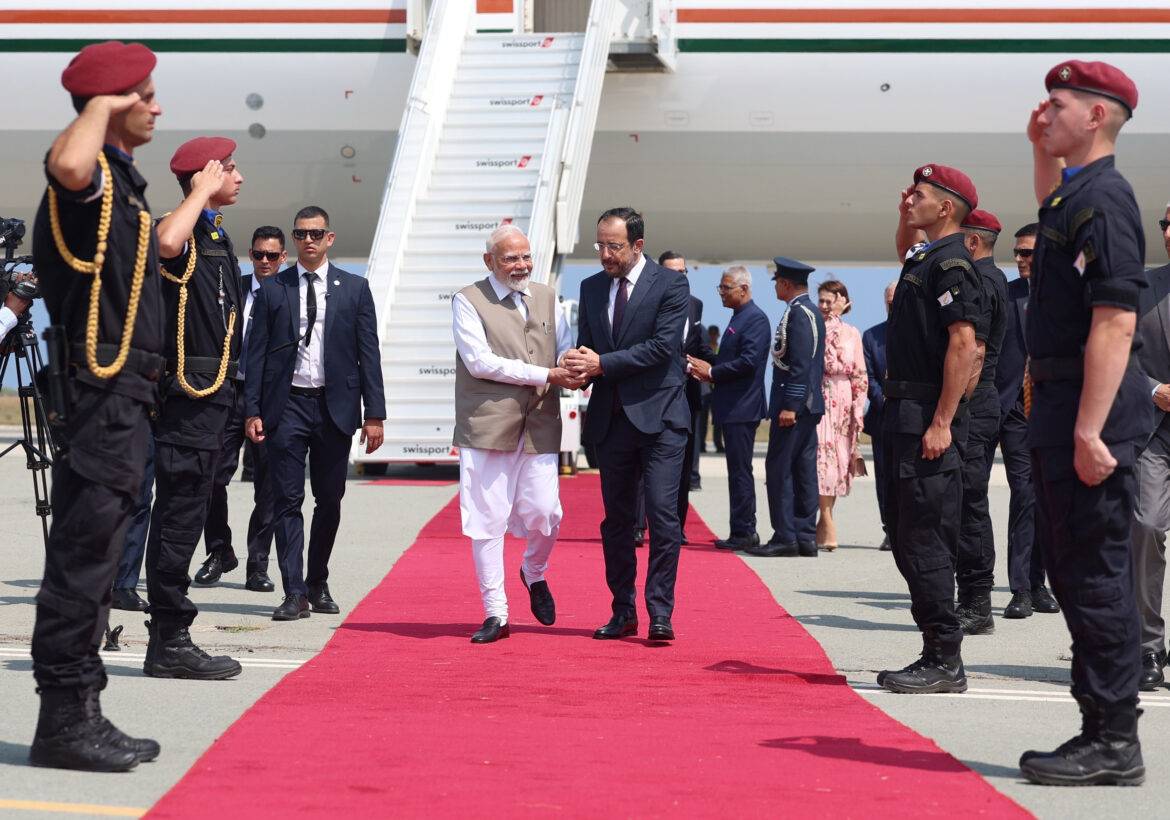AI Generated Summary
- Cyprus’s location at the crossroads of Europe, the Middle East, and North Africa, combined with its maritime infrastructure, positions it as a crucial node in the India-Middle East-Europe Economic Corridor (IMEC).
- According to diplomatic sources, the outreach is a calculated step to counterbalance the growing alignment between Turkey and Pakistan, two nations often at odds with India on international platforms.
- With IMEC emerging as a flagship initiative to enhance India’s connectivity to Europe via the Middle East, Cyprus could become a vital partner in realizing this vision.
Prime Minister Narendra Modi arrived in Cyprus yesterday, aiming to strengthen bilateral ties and solidify India’s presence in a region of growing geopolitical importance.
The visit, his first overseas trip following Operation Sindoor — India’s recent military action against Pakistan — carries deeper strategic implications. According to diplomatic sources, the outreach is a calculated step to counterbalance the growing alignment between Turkey and Pakistan, two nations often at odds with India on international platforms.
A New Node in the IMEC Vision
Cyprus’s location at the crossroads of Europe, the Middle East, and North Africa, combined with its maritime infrastructure, positions it as a crucial node in the India-Middle East-Europe Economic Corridor (IMEC). With IMEC emerging as a flagship initiative to enhance India’s connectivity to Europe via the Middle East, Cyprus could become a vital partner in realizing this vision.
“Cyprus offers both strategic location and political alignment,” a senior government official noted, pointing to the island nation’s longstanding disputes with Turkey and its consistent support for India’s positions on contentious global issues — including Kashmir, cross-border terrorism, and United Nations Security Council reforms.
Energy and Economic Diplomacy
Beyond geopolitical symbolism, the visit has a strong economic and energy dimension. Cyprus plays an active role in Eastern Mediterranean natural gas exploration — a region rife with regional tension, particularly around Turkish drilling activities. India, seeking to diversify its energy sources amid global supply shifts, is reportedly exploring potential partnerships in this volatile yet resource-rich zone.
Trade and investment are also high on the agenda. Cyprus remains a notable source of foreign direct investment into India and shares a Double Taxation Avoidance Agreement (DTAA) with New Delhi. Meetings in Limassol with Cypriot business leaders are expected to focus on scaling up commercial cooperation, particularly in financial services, real estate, and shipping.
Defence Cooperation in Focus
As Cyprus grapples with its own security concerns stemming from tensions with Turkey, both nations are expected to discuss ways to expand defence collaboration. While the details remain under wraps, officials confirmed that greater military-to-military engagement is on the table.
“The regional dynamics are changing rapidly. This visit underlines India’s intent to proactively shape partnerships that support its strategic goals — not just in South Asia, but across the Mediterranean,” a source familiar with the planning of the trip said.
Building EU Leverage Ahead of G7
Modi’s stop in Cyprus also carries broader diplomatic significance. Cyprus has been a consistent supporter of India’s ambitions in multilateral fora, including its bids for the Nuclear Suppliers Group (NSG) and permanent membership in the UN Security Council. Nicosia was also an early endorser of the India-US Civil Nuclear Agreement — a move that India continues to regard as politically valuable.
With the G7 Summit in Canada just days away — and India-Canada relations currently strained — strengthening ties with European allies like Cyprus could provide much-needed diplomatic capital as Modi heads into potentially tense multilateral negotiations.
As the Mediterranean becomes an increasingly contested geopolitical arena, India’s pivot to Cyprus signals a clear intention: to expand its strategic footprint through pragmatic partnerships that bridge energy, defence, commerce, and diplomacy.




